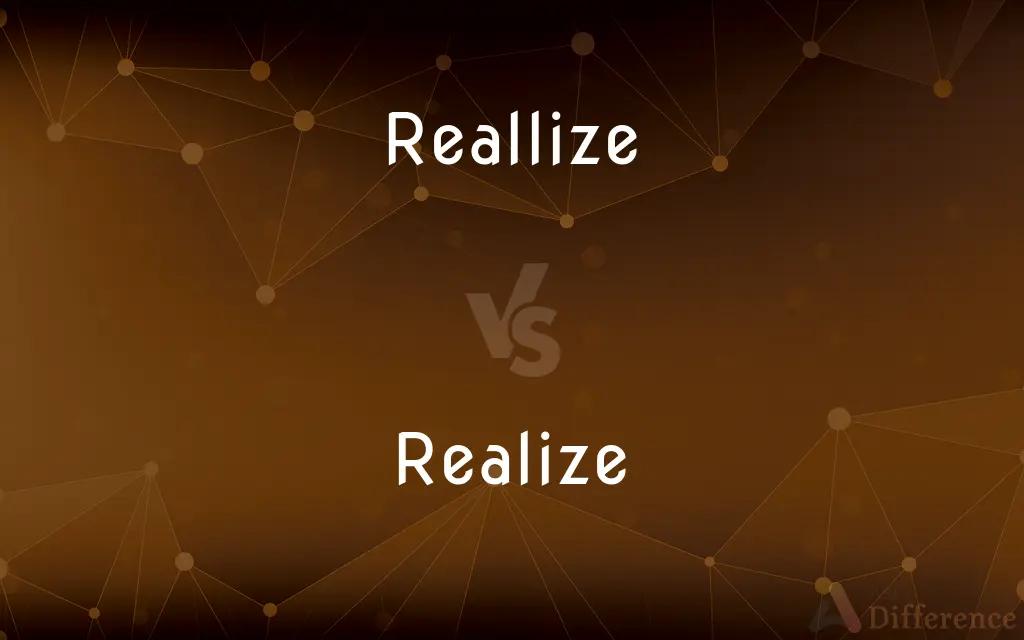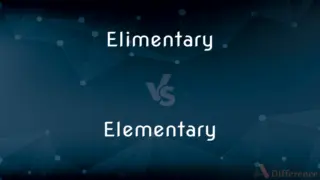Reallize vs. Realize — Which is Correct Spelling?
Edited by Tayyaba Rehman — By Fiza Rafique — Updated on April 3, 2024
"Reallize" is a misspelling. The correct form is "realize," which means to become aware of or understand something.

Table of Contents
Which is correct: Reallize or Realize
How to spell Realize?

Reallize
Incorrect Spelling

Realize
Correct Spelling
ADVERTISEMENT
Key Differences
Visualize a light bulb turning on as one "realizes" an idea, focusing on the "ize" ending.
Associate "realize" with "reality" to remember the single "l".
Think of "eyes" when you realize something, hinting at a single "l".
Remember that "realize" begins with "real" as in genuine or actual.
Recall that "realize" matches other "ize" verbs like "prioritize" or "categorize."
ADVERTISEMENT
How Do You Spell Realize Correctly?
Incorrect: It's hard to reallize your dreams without hard work.
Correct: It's hard to realize your dreams without hard work.
Incorrect: They failed to reallize the impact of their actions.
Correct: They failed to realize the impact of their actions.
Incorrect: She began to reallize the truth behind their words.
Correct: She began to realize the truth behind their words.
Incorrect: When did you reallize that you had lost your keys?
Correct: When did you realize that you had lost your keys?
Incorrect: He didn't reallize the importance of the meeting.
Correct: He didn't realize the importance of the meeting.
Realize Definitions
To achieve or fulfill a dream, ambition, or goal.
He realized his dream of becoming a doctor.
To convert assets into money.
She realized a profit from the sale.
To become aware of or understand.
She soon realized her mistake.
To bring into concrete existence.
The artist realized his vision in the sculpture.
To comprehend completely or correctly.
To bring into reality; make real
He finally realized his lifelong ambition to learn how to play the violin.
To make realistic
A film that realizes court life of the 1600s.
To obtain or achieve, as gain or profit
She realized a substantial return on the investment.
To bring in (a sum) as profit by sale.
To exchange holdings or goods for money.
To make real; to convert from the imaginary or fictitious into reality; to bring into real existence
The objectives of the project were never fully realized.
(transitive) To become aware of (a fact or situation, especially of something that has been true for a long time).
He realized that he had left his umbrella on the train.
The defendant desperately yelled at her young daughter, frantic to make her realize what she had done.
(transitive) To cause to seem real to other people.
(transitive) To sense vividly or strongly; to make one's own in thought or experience.
To acquire as an actual possession; to obtain as the result of plans and efforts; to gain; to get
To realize large profits from a speculation
To convert any kind of property into money, especially property representing investments, such as shares, bonds, etc.
Profits from the investment can be realized at any time by selling the shares.
By realizing the company's assets, the liquidator was able to return most of the shareholders’ investments.
To convert into real property; to make real estate of.
To turn an abstract linguistic object into actual language, especially said of a phoneme's conversion into speech sound.
The southern /v/ is realized as the voiced approximant [ʋ].
To make real; to convert from the imaginary or fictitious into the actual; to bring into concrete existence; to effectuate; to accomplish; as, to realize a scheme or project.
We realize what Archimedes had only in hypothesis, weighing a single grain against the globe of earth.
To cause to seem real; to impress upon the mind as actual; to feel vividly or strongly; to make one's own in apprehension or experience.
Many coincidences . . . soon begin to appear in them [Greek inscriptions] which realize ancient history to us.
We can not realize it in thought, that the object . . . had really no being at any past moment.
To convert into real property; to make real estate of; as, to realize his fortune.
To acquire as an actual possession; to obtain as the result of plans and efforts; to gain; to get; as, to realize large profits from a speculation.
Knighthood was not beyond the reach of any man who could by diligent thrift realize a good estate.
To convert into actual money; as, to realize assets.
To convert any kind of property into money, especially property representing investments, as shares in stock companies, bonds, etc.
Wary men took the alarm, and began to realize, a word now first brought into use to express the conversion of ideal property into something real.
Be fully aware or cognizant of
Perceive (an idea or situation) mentally;
Now I see!
I just can't see your point
Does she realize how important this decision is?
I don't understand the idea
Make real or concrete; give reality or substance to;
Our ideas must be substantiated into actions
Earn on some commercial or business transaction; earn as salary or wages;
How much do you make a month in your new job?
She earns a lot in her new job
This merger brought in lots of money
He clears $5,000 each month
Convert into cash; of goods and property
Expand or complete (a thorough-based part in a piece of baroque music) by supplying the harmonies indicated in the figured bass
To make something real or tangible.
The team realized the concept with their prototype.
Realize Meaning in a Sentence
She came to realize that her happiness was in her own hands.
Once she saw the evidence, she began to realize the gravity of the situation.
When I woke up, I didn't immediately realize where I was.
You may not realize the effect your words can have on others.
Many people dream of success but don't realize the effort it requires.
He didn't realize the value of the gift until much later.
To realize their goals, they knew they needed a solid plan.
It took him a while to realize that he was on the wrong path.
It's amazing to realize how much we've accomplished in just a few years.
He came to realize that true friends are hard to come by.
She hoped to realize a profit from her investment within a year.
They didn't realize the severity of the storm until it was too late.
The company hopes to realize significant growth over the next quarter.
Sometimes, you don't realize what you have until it's gone.
You might not realize the impact of small changes in your daily routine.
She began to realize the importance of taking care of her mental health.
It's important to realize the difference between what you want and what you need.
Realize Idioms & Phrases
Realize a dream
To make a dream or goal come true.
After years of hard work, she finally realized her dream of opening her own restaurant.
Realize your potential
To understand and develop your abilities to their fullest.
With the right guidance, he began to realize his potential as an artist.
Realize the importance of
To understand how important something is.
She didn't realize the importance of her health until she fell ill.
Common Curiosities
Why is it called realize?
The term "realize" originates from the French word "réaliser" meaning "to make real."
Which vowel is used before realize?
The vowel "a" is used before the "l" in "realize."
What is the pronunciation of realize?
Realize is pronounced as /ˈriːəˌlaɪz/.
What is the singular form of realize?
"Realize" itself is in singular form.
Which conjunction is used with realize?
Any conjunction can be used with "realize" based on context.
What is the root word of realize?
The root is "real."
What is the verb form of realize?
"Realize" itself is a verb.
Which preposition is used with realize?
Prepositions like "of," "that," or "about" can be used with "realize."
Which article is used with realize?
As a verb, "realize" doesn't typically require an article.
What is the plural form of realize?
Verbs don't have a plural form. However, its noun form "realization" has a plural form, "realizations."
Is realize a collective noun?
No, "realize" is not a collective noun.
How many syllables are in realize?
Three syllables.
How do we divide realize into syllables?
Re-al-ize.
What is a stressed syllable in realize?
The stressed syllable is "re."
What part of speech is realize?
"Realize" is a verb.
Which determiner is used with realize?
Determiners like "this," "that," "my," or "her" can be used with the noun form "realization."
Is realize an adverb?
No, "realize" is not an adverb.
Is realize an abstract noun?
No, but its noun form "realization" can be considered abstract.
What is the opposite of realize?
Overlook or ignore.
Is the word realize imperative?
"Realize" can be used in the imperative mood, as in "Realize your potential!"
What is the first form of realize?
Realize.
What is the third form of realize?
Realized.
How is realize used in a sentence?
"I didn't realize the time until it was too late."
Is realize a noun or adjective?
"Realize" is a verb.
Is realize a vowel or consonant?
"Realize" is a word containing both vowels and consonants.
What is another term for realize?
Recognize or understand.
What is the second form of realize?
Realized.
Is realize a negative or positive word?
"Realize" is neutral; context determines its positivity or negativity.
Is realize a countable noun?
"Realize" is a verb, not a noun. Its related noun "realization" is countable.
Is the realize term a metaphor?
Not inherently, but it can be used metaphorically.
Share Your Discovery

Previous Comparison
Pistoale vs. Pistol
Next Comparison
Elimentary vs. ElementaryAuthor Spotlight
Written by
Fiza RafiqueFiza Rafique is a skilled content writer at AskDifference.com, where she meticulously refines and enhances written pieces. Drawing from her vast editorial expertise, Fiza ensures clarity, accuracy, and precision in every article. Passionate about language, she continually seeks to elevate the quality of content for readers worldwide.
Edited by
Tayyaba RehmanTayyaba Rehman is a distinguished writer, currently serving as a primary contributor to askdifference.com. As a researcher in semantics and etymology, Tayyaba's passion for the complexity of languages and their distinctions has found a perfect home on the platform. Tayyaba delves into the intricacies of language, distinguishing between commonly confused words and phrases, thereby providing clarity for readers worldwide.


































